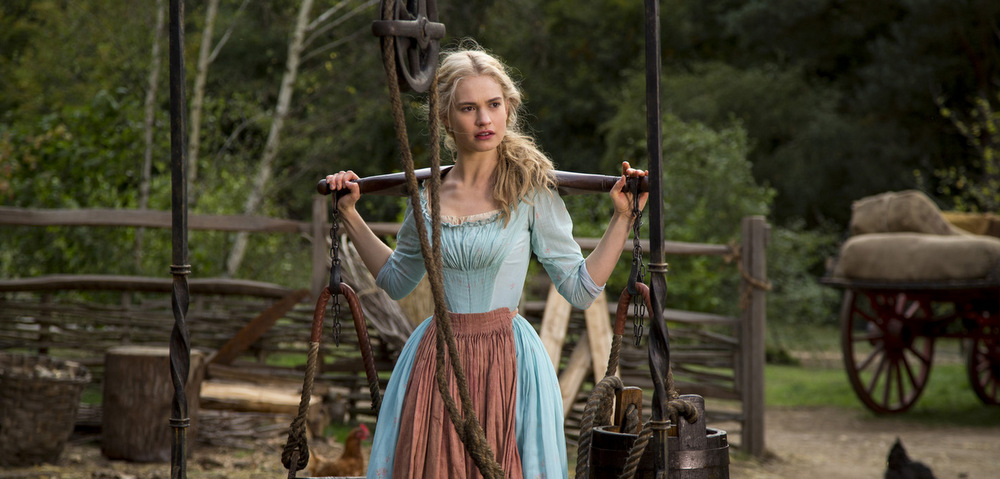In the recent Cinderella (2015), directed by Kenneth Branagh (Thor, Hamlet), Disney reminds viewers of the age-old story, where a beautiful young maiden ascends from being an ignored servant to being a beloved princess. The film, though, was both entertaining and worrying, and presented a potentially detrimental definition of ‘kindness’.
Ella, played by the delightful Lily James, is a glowing real-life picture of the original Disney cartoon. The film’s Georgian setting, complete with brocade decoration, printed fabrics, and Fragonard paintings, creates an enchanting world. It is pretty as a picture, or more accurately, a baroque painting. Yet, the film is also deeply concerning. With a strong theme of emotional abuse present, the heroine espouses a platitude that goes woefully unchallenged for the duration of the film, causing one to wonder how that platitude will be interpreted by the thousands of children who eagerly went to the theatre dressed up in blue ball-gowns and tiny slippers.
‘Have courage and be kind’ are the words Ella’s dying mother whispers as a last instruction to the daughter she’s about to leave behind. Ella promises to keep the maxim, and throughout the rest of the film, she is trodden on, abused, and ridiculed by her stepmother and stepsisters. Why does she remain in the household and under the dominance of women she knows do not have her best interest in mind? Because, Ella must be kind.
It would seem that Ella’s definition of kindness leaves no room for her to defend her basic human rights. This climaxes when Ella and her stepmother confront each other, both standing in the attic of Ella’s confinement. In the theatre, I sat forward with glee, hoping for the kind of speech Gail Carson Levine gives her Cinderella in Ella Enchanted [1], or even that which Shannon Hale gives her Goose Girl [2]—goodness, I would even have taken the grimy Drew Barrymore of Ever After, wavering English accent and all, yelling that she just wanted her stepmother to love her [3]—a speech that develops the newfound self-respect of the heroine, and yet still manages to establish some degree of forgiveness or understanding of the villain.
But here Ella is simply left wondering why her stepmother treated her so, and no dialogue was spared to assure Ella she was worth more than the present treatment, no comment on how kindness leaves room for and supports self-dignity. Shortly after, when the prince arrives to make her a princess, Ella easily abandons her home, giving the impression that her residence there was more of a plot device than an illuminating reflection upon her character, the prince providing the catalyst Ella needs to change her lifestyle rather than provoking a more self-begot and rigorously realized change already existent within herself.
Branagh’s Cinderella has been hailed as the ‘Christian’ remake of Cinderella [4] and a narrative return to the lost innocence of fairy-tales.[5] But this raises the question, what is the Christian definition of kindness? Do we, like Ella, fight for the safety of others, of the prince, but allow ourselves to become the pretty doormat of the worst influences in our lives? Do we, like Ella, allow the slander of the stepsisters to become our identity?
Is this the life that we as Christians are called to? The majority of Christian engagements with the film have responded ‘yes’. Christ was crucified, after all. And we, as Christians, are called to be self-sacrificing in kind. But there is a crucial difference between a Christian martyr and Branagh’s Cinderella, which hopefully will make the answer ‘no’.
Kindness, as an act of self-sacrifice, is not something that comes from a place of insecurity. If an aggressor takes something from a young girl, who gives it merely out of an inability or reluctance to defend herself, it is not called kindness. It is called domestic abuse. One would hope that the heroine could love herself or come to love herself while submitting to her stepmother’s demands. Then, Ella’s ‘kindness’ would be self-sacrifice; the things she gives would be given out of her own accord (2 Corinthians 8:5). The overall narrative of the film would not need to change if Ella’s kindness came from self-sacrifice rather than insecurity. Ella would still be with her step-family, she would meet the prince, and she would become a princess. But, instead of being a victim, she would be a martyr for, then a prophet of, her belief in kindness—which would make all the difference in the world.
Can the film be enjoyed in it’s own right, despite it’s reluctance to define ‘kindness’ and ‘courage’? Yes, by all means. But breathtaking costumes and special effects pumpkins can’t make up for narrative shortcomings. The children still hero-worshipping Cinderella, as evidenced by their desire to dress as her, to be her, need to understand that their kindness can come from a place of self-worth and self-dignity—that they do not have to be unwilling victims in their own stories. And should the aggressor in their lives begin to take things they are not comfortable giving, that they have the power to say no and leave, even before the Prince comes along.





